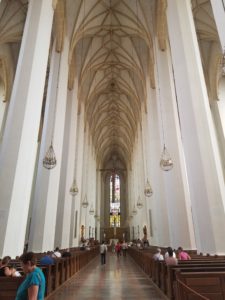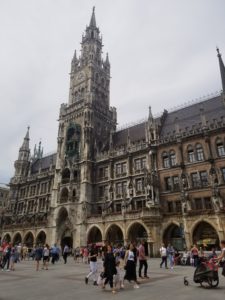At the end of May I was able to participate in one of Munich’s biggest religious citywide ceremonies, Fronleichnam, or Corpus Christi, as we call it in the US. It was a very warm day, and the Mass began in midmorning. When I arrived in Marienplatz, where Mass was celebrated, I found many different communities gathered under representative banners: student groups, Handwerker organizations, Polish and Vietnamese communities formed part of the assembly, each attired in traditional garb.

The Mass was celebrated by Cardinal Reinhard Marx, and his homily was on going with Christ through time – “Mit Christus durch die Zeit” – he also talked about reading the signs of the times and the citywide celebration being one of joy and not power. Mass was followed by a procession through the city to Königsplatz. There are questions these days in Bavaria about how Christian identity should be represented in the public sphere. The state government, led by Markus Söder, has determined that Crosses will be hung at each public opening to a government building. Söder recognizes the Cross as an essential part of Bavarian culture and history, a recognition of its Christian roots and foundation.

The Sunday before was Dreifaltigkeitssonntag (The Feast of the Holy Trinity), and in the cathedral, Frauenkirche, the homilist addressed the topic of cultural identity in Bavaria through the prayer of the Sign of the Cross. He affirmed that the Cross is a sign of identity, but before being a marker of identity with a culture, it marks identity with the Trinity, “In Namen des Vaters, und des Sohnes, und des Heiligen Geistes.” He continued by emphasizing that this needs to be remembered in a debate that may lose sight of the meaning of the Cross.

The week before, I had the grace of meeting a Benedictine priest, Fr. Stephan Haering, who lives in my apartment building, and is a professor of canon law at Ludwig Maximilian’s University. As a representative of the University he concelebrated Mass with Cardinal Marx and a number of other bishops and priests. During this first meeting, I was able to speak with him about my philosophy and theology studies, his work and vocation, and aspects Germany and Bavaria in general (all in German, with his patient assistance!). He even spoke with me about the dialect he grew up speaking, comparing the basic sentence same sentence in Boarisch and German (in Boarisch I understood nothing whatsoever). Since then I have visited with him for dinner each Wednesday, after he celebrates Mass for sisters in an abbey directly next to my apartment. It is quite a gift to meet with him and the sisters!